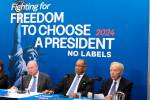AGA wants to hear presidential candidates’ stances on gaming
After encouraging presidential candidates this summer to be aware of gaming issues, the American Gaming Association now wants to learn their actual stances.
The Washington, D.C.-based trade organization sent a questionnaire this week to all the current Republican and Democratic candidates for president, seeking their positions on everything from daily fantasy sports, illegal gambling, regulation, tourism and proposed Internal Revenue Service changes on tracking the activities of casino customers.
The AGA will use the information gathered from the questionnaire to compile a voter guide that will be distributed to some 1 million gaming employees and casino industry vendors and ancillary services across 40 states before voting begins with the Iowa caucuses on Feb. 1.
The questionnaire was sent out two weeks before the nationally televised Dec. 15 GOP candidates debate at The Venetian.
AGA CEO Geoff Freeman said the organization wants casino employees to know where candidates stand on the gaming industry and its various issues.
"While candidates have no shortage of issues to consider and debate, we encourage candidates to take the time to demonstrate their support — through this questionnaire, a back-of-the-house tour and in other ways — for an industry that is creating a path to the middle class for workers of all backgrounds and experiences," Freeman said in a statement.
AGA spokesman Chris Moyer said the 10-page questionnaire was sent to all current candidates regardless of their standings in recent polls.
The questionnaire is part of the AGA's "Gaming Votes" grass-roots initiative that aims to ensure 2016 presidential candidates don't forget that gaming is an economic engine in many local communities. The AGA often mentions last year's economic impact report, which found the gaming industry represents $240 billion annually in economic impact and supports 1.7 million jobs in 40 states.
In early voting and battleground states, the AGA says gaming supports more than 500,000 jobs and contributes $75 billion to local communities.
The questionnaire focuses on gaming specifically, but also broader business issues, such as immigration.
Freeman said the questions will gauge candidates' comfort with embracing casinos. The AGA is asking candidates if they would be willing to meet with gaming employees at a casino, if they back the industry, and if they believe casino gaming is a positive force for economic development and job creation.
Freeman wrote a letter to presidential candidates this summer encouraging them to learn about the casino industry. The AGA has since visited Ohio, Iowa, Colorado and Nevada to mobilize the gaming workforce before casting ballots in 2016.
For the first time, several presidential contenders have hands-on knowledge of the casino industry because they come from states with resorts owned by Las Vegas-based gaming companies.
On the Republican side, Govs. Chris Christie of New Jersey and John Kasich of Ohio oversee two of the largest casino states.
Billionaire Donald Trump as Atlantic City's largest casino owner in the 1980s and 1990s with three resorts. Trump is no longer involved in the gaming industry. Trump Entertainment Resorts was formed after his casinos emerged from the second of three bankruptcies. The business is controlled by financier Carl Icahn, but Trump retains a 10 percent stake and leases the rights to his name.
Former Maryland Gov. Martin O'Malley, a Democrat, held office during his state's rapid gaming expansion.
Meanwhile, former Republican New York Gov. George Pataki was a co-chairman of the Coalition to Stop Internet Gambling, the grass-roots organization financed by Las Vegas Sands Corp. Chairman — and GOP megadonor — Sheldon Adelson. An Adelson-backed Senate bill seeking a ban on Internet gaming was sponsored by Sens. Lindsey Graham of South Carolina and Marco Rubio of Florida, both Republican presidential candidates.
In an interview with the Las Vegas Review-Journal editorial board in October, Rubio hinted he could support language, however, that would allow for Internet poker.
Contact reporter Howard Stutz at hstutz@reviewjournal.com or 702-477-3871. Find him on Twitter: @howardstutz




























